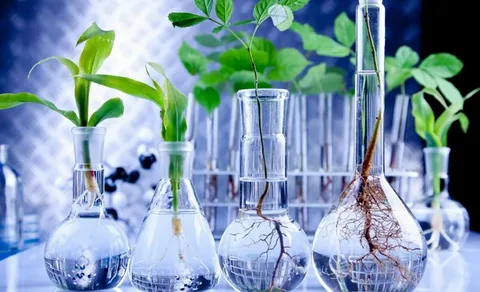Introduction
The global population is on an upward trajectory, and with it, the demand for food is reaching unprecedented levels. To meet the nutritional needs of a growing world, biotechnology is playing a pivotal role in shaping the future of food production. This article explores the transformative impact of biotechnology on agriculture, from enhancing crop yields to creating sustainable and resilient food systems.
Precision Farming Techniques
Biotechnology enables precision farming, a data-driven approach that optimizes crop management. Technologies like sensors, GPS-guided tractors, and data analytics allow farmers to make informed decisions about irrigation, fertilization, and pest control. This results in improved efficiency and resource utilization.
Genetic Modification for Crop Improvement
Genetic modification, a key aspect of biotechnology, involves altering the genetic makeup of crops to enhance desirable traits. This can include traits like resistance to pests, tolerance to environmental stress, and increased nutritional content. Biotechnological advances have accelerated the development of genetically modified (GM) crops with improved yields and resilience.
Drought-Resistant Crops
Biotechnology plays a crucial role in developing crops that can thrive in challenging environmental conditions. Drought-resistant crops, engineered to withstand water scarcity, offer a sustainable solution for regions prone to drought. These crops contribute to food security by ensuring stable yields even in arid climates.
Disease-Resistant Varieties
The susceptibility of crops to diseases can lead to significant yield losses. Biotechnology allows for the development of disease-resistant crop varieties. By introducing genetic traits that confer resistance, farmers can reduce the reliance on chemical pesticides, promoting environmentally friendly and sustainable agriculture.
Vertical Farming for Efficient Land Use
Biotechnology intersects with innovative farming practices like vertical farming. In vertical farming, crops are grown in stacked layers, often in controlled indoor environments. This method optimizes land use, reduces the need for large agricultural spaces, and allows for year-round cultivation.
Bioreactors for Alternative Protein Production
Bioreactors, commonly associated with biotechnology and pharmaceutical manufacturing, are increasingly being used in alternative protein production. Microorganisms or plant cells cultured in bioreactors can be harnessed to produce proteins, offering sustainable alternatives to traditional animal-based protein sources.
CRISPR-Cas9 and Precision Breeding
The revolutionary CRISPR-Cas9 technology allows for precise and targeted modifications to an organism’s DNA. In agriculture, CRISPR-Cas9 is used for precision breeding, enabling the introduction of specific genetic traits without the introduction of foreign genes. This technology accelerates the development of crops with desired characteristics.
Accelerated Crop Improvement
Precision breeding techniques offer a faster and more precise way to improve crop varieties. Traditional breeding methods can take years, while precision breeding techniques significantly reduce the timeline for developing new crop varieties with improved traits such as nutritional content, taste, and shelf life.
Addressing Ethical Concerns
The adoption of biotechnology in food production raises ethical considerations related to genetic modification and the potential long-term effects on ecosystems. Responsible and transparent practices, along with rigorous safety assessments, are essential to address these concerns and build public trust.
Public Perception and Education
Public perception plays a crucial role in the acceptance of biotechnological advancements in agriculture. Education and communication efforts are necessary to inform the public about the benefits, safety measures, and ethical considerations associated with biotechnology in food production.
Conclusion
Biotechnology is shaping the future of food production by offering innovative solutions to address the challenges of a growing population and a changing climate. From precision agriculture and genetic modification to sustainable farming practices and alternative protein sources, biotechnological advancements are enhancing the efficiency, resilience, and sustainability of global food systems. As the technology continues to evolve, careful consideration of ethical concerns and public engagement will be essential in realizing the full potential of biotechnology in securing a food-secure future.
FAQs
How does biotechnology contribute to precision agriculture?
Biotechnology contributes to precision agriculture by enabling data-driven farming techniques. Technologies like sensors, GPS-guided tractors, and data analytics empower farmers to make informed decisions about crop management, leading to improved efficiency and resource utilization.
What is genetic modification, and how does it enhance crop traits?
Genetic modification involves altering the genetic makeup of crops to enhance desirable traits. This can include resistance to pests, tolerance to environmental stress, and increased nutritional content. Biotechnological advances in genetic modification accelerate the development of crops with improved yields and resilience.

